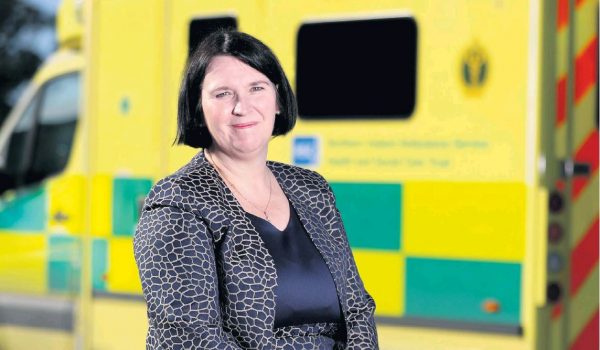An inquisitive mind and the ability to ask difficult questions are crucial in Nicole Lappin’s role as a non-executive director.
The Post: Chair, Northern Ireland Ambulance Service
The Post Holder: Nicole Lappin
Give a brief outline of your career to date.
Once qualified, I practised as a barrister for five years, first in Dublin and then in Belfast. Following a career break from practice I began teaching as a part-time tutor at the Institute of Professional Legal Studies. During this time, was appointed as a non-executive director of the Education Authority (EA), where I served for two years. After leaving the EA, I was appointed as an independent Board member of the NI Courts and Tribunals Service and as a non-executive director of the Irish Auditing and Accounting Supervisory Authority in Dublin. I was appointed Chair of Northern Ireland Ambulance Service (NIAS) in July 2018 for a four year term. I was also recently appointed as the Chief Commissioner of the Charity Commission for Northern Ireland.
What was your favourite subject at school?
Chemistry.
Did you go on to further / higher education, if so what did you study and where?
I gained a law degree from Queen’s University Belfast before studying for my Barrister-at-law degree in King’s Inns Dublin. I am delighted that I had the opportunity to study in both Belfast and Dublin.
How did you get into your area of work?
I had been a school governor for about ten years, having always had an interest in education and a belief in the importance of it. I was involved in a parent driven campaign regarding the retention of a system of education known as the Dickson Plan. Through this I attended many board meetings held by the Southern Education and Library Board. I became fascinated by the role of the board. When the Education Authority was established I contacted one of the nominating bodies and asked them to consider nominating me onto the EA board. Although non-executive positions are usually appointed through the public appointment process, the EA appointments are different. I was delighted to be nominated onto the EA and have thoroughly enjoyed every moment since.
Is this what you always wanted to do?
No. Prior to becoming a school governor I had no idea what role governors and non-execs play and the contribution they make to society. Before attending the SELB board meetings I always thought that such roles were performed by others. It hadn’t occurred to me that I could perform that role too. There is no such thing as a typical non-executive director.
Were there any particular essential qualifications or experience needed?
No formal qualifications as such. However, life skills and experience are important. Before being appointed onto the EA I had to supply a CV where I detailed my experience within education.
What are the main personal skills your job requires?
To bring diverse views to the board table and to ask the stupid question (everyone else is thinking it). The capability to avoid being swayed by emotion and to weigh up evidence leading to a reasoned decision. The potential to self-reflect and the preparedness to take difficult decisions in the face of public opposition are also useful. An inquisitive mind helps. However, the single most important skill for me is the ability to develop productive relationships with board colleagues and Department of Health staff.
What does a typical day entail?
There is no such thing. My time involves meetings with board colleagues, including the Executive team, NIAS staff, Department of Health meetings and other stakeholders, such as political representatives. My role also includes representing NIAS at events such as, a British Isles-wide meeting of Ambulance Chairs and Chief Executives; participating in a Department of Health workstream looking at the implementation of recommendations arising out of the Hyponatremia Inquiry and sitting on recruitment and selection panels.
What are the best and most challenging aspects of the job?
Every day I feel privileged to carry out this role. The best aspect is learning about how much NIAS staff are appreciated by the public, despite the awful attacks that our ambulance crew and call takers can be subjected to. The most challenging aspects are in developing an effective method of communicating with our staff who are spread right across Northern Ireland. The demands of their jobs mean that they do not have much time to consider corporate communications. Both the Chief Executive and I regard proper and timely communication to be key to keeping our staff informed of developments within the organisation.
Why is what you do important?
An effective board will lead to an improvement in the delivery of public services. When the appropriate balance of scrutiny and support is offered to the executive team, everyone benefits.
What advice would you give anyone looking to follow a similar career path?
Apply. Non-executive roles are not just for other people. They are for you too. Consider applying to become a Boardroom Apprentice. NIAS has its first Boardroom Apprentice, Sarah Sellars, and I wish her well at the beginning of her Non-Exec journey. Check out www.strictlyboardroom. com.
If you weren’t doing this what would you like to do?
Anything where I can add value.
What is the one piece of advice you would give to yourself on your first day?
You don’t know everything so don’t pretend that you do.
Describe your ideal day off.
A barbecue at Portballintrae picnic tables, overlooking Runkerry beach followed by a walk at the edge of the sea to the far end of the beach. Perfect at any time of the year.
Searching for your next career move?
In need of some more career inspiration? Be inspired on the nijobfinder blog.


